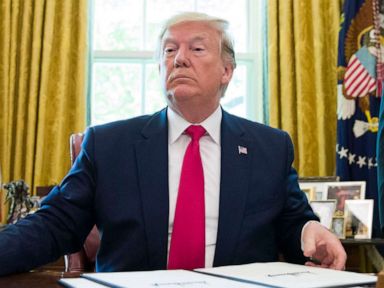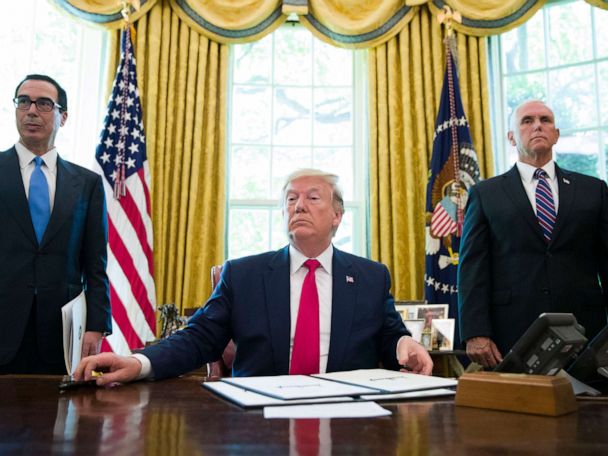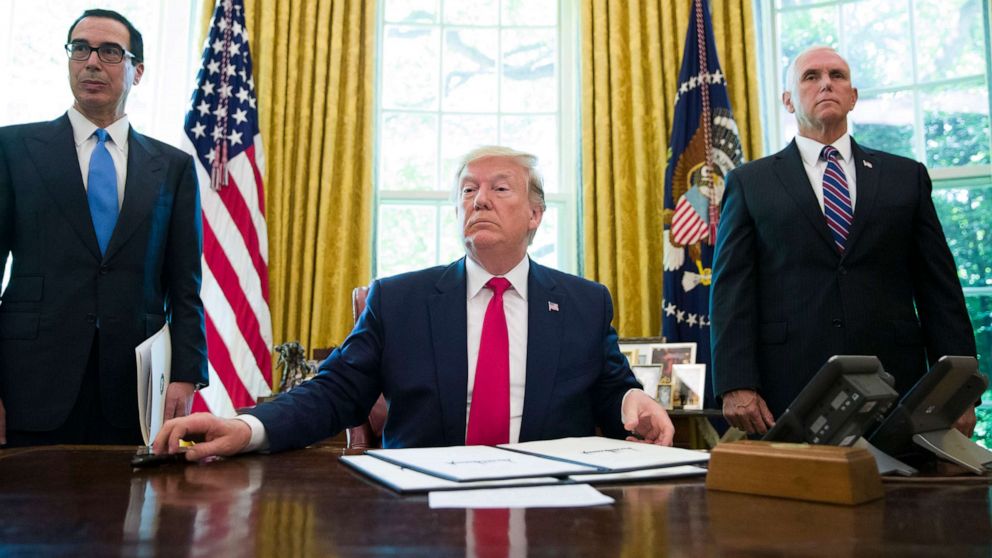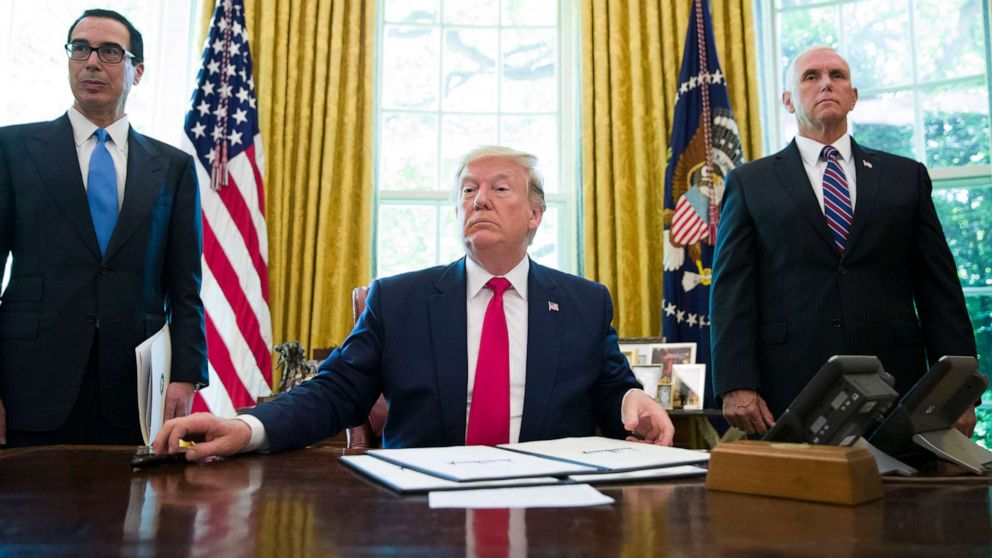






It’s Tuesday, June 25, 2019. Let’s start here.
1. Iran, let’s talk
As he introduced another round of economic sanctions on Iran, President Donald Trump had a message for Ayatollah Ali Khamenei.
“He has the potential to have a great country and quickly, very quickly,” Trump said on Monday, expressing his desire for diplomatic talks. “I think they should do that rather than going along this very destructive path.”
President Trump announces new Iran sanctions: “These measures represent a strong and proportionate response to Iran’s increasingly provocative actions. We will continue to increase pressure on Tehran until the regime abandons its dangerous activities” https://t.co/Kd4VN81FMk pic.twitter.com/txvSAP5grr
It’s the latest effort by the Trump administration to “turn the screws pretty tightly on Iran,” according to ABC News Chief White House Correspondent Jonathan Karl.
With hopes of drawing up a new nuclear agreement with Iranian leadership, Karl adds that Trump “is making an appeal to negotiations. He wants to sit down … with the ayatollah. He’ll sit down with anybody without preconditions, but the endgame must be towards keeping Iran from getting a nuclear weapon.”
Iran’s ambassador to the United Nations, Majid Takht-Ravanchi, rejected the idea that more sanctions would pressure Iranians to negotiate, saying, “You cannot start a dialogue with somebody who is threatening you, who is intimidating you.”
2. ‘Humanitarian crisis’
The Trump administration is reportedly moving hundreds of migrant children from a Texas holding facility amid growing outrage over unsanitary conditions at border detention centers.
A board-certified physician who accompanied lawyers on visits to holding facilities in Clint and McAllen, Texas, described the conditions as comparable to “torture facilities,” which “felt worse than jail,” according to a medical declaration obtained exclusively by ABC News.
U.S. Customs and Border Protection has called for additional humanitarian funding and said in a statement that border officials are leveraging limited resources “to provide the best care possible for those in our custody, especially children.”
The Department of Homeland Security is struggling to handle the issue alone as lawmakers continue to try to negotiate border funding, but John Cohen, former acting undersecretary at DHS and an ABC News contributor, says Trump could do something about it.
“The president declared a national emergency — he has the ability to move money to deal with the conditions at the border,” Cohen says on “Start Here.” “The problem is that money is not going to deal with the humanitarian crisis. He’s seeking to move money to build a border wall, which … would have no impact on the crisis as it currently stands.”
3. $1.6 trillion
Sen. Bernie Sanders, I-Vt., is the latest Democratic presidential candidate to release a sweeping proposal to eliminate student loan debt.
His plan to universally wipe out $1.6 trillion in student loans and make public colleges and trade schools tuition-free got the stamp of approval on Monday from Rep. Alexandria Ocasio-Cortez, D-N.Y., who said she’s still paying off her own loans.
Rep. Alexandria Ocasio-Cortez speaks at presser on bill to eliminate all student debt: “It was literally easier for me to become the youngest woman in American history elected to Congress than it is to pay off my student loan debt.” https://t.co/dsdHrgtz3Z pic.twitter.com/boAO4mgaJi
Sandy Baum, a higher education policy analyst and nonresident fellow in the Center on Education Data and Policy at the Urban Institute, tells us what the proposal could look like: “If somebody borrowed a couple hundred thousand dollars to go to medical school or law school, they’re going to essentially get that check in the mail.”
Baum also wonders whether that money could be better spent elsewhere: “What could we do with that $1.6 trillion? What about early childhood education? What about K-12 education? What about all the people who don’t have access to health care?”
4. Gay teacher fired
An openly gay teacher was fired from a Catholic school in Indiana after a push by the Archdiocese of Indianapolis for local schools to cut ties with educators in same-sex relationships.
In a letter posted to its website, Cathedral High School’s president and chairman of the board of directors said it was an “agonizing decision” to “separate” from the teacher to retain its “Catholic identity.”
The archdiocese said in a statement: “This issue is not about sexual orientation; rather, it is about our expectation that all personnel inside a Catholic school — who are ministers of the faith — abide by all Church teachings, including the nature of marriage.”
“They’re arguing that it’s not so much that they’re gay, it’s that they’re going against the church’s teachings, and teachers at these Catholic schools are supposed to be representative of the church’s teachings,” explains ABC News’ Meghan Keneally.
“Start Here,” ABC News’ flagship podcast, offers a straightforward look at the day’s top stories in 20 minutes. Listen for free every weekday on Apple Podcasts, Google Podcasts, iHeartRadio, Spotify, Stitcher, TuneIn or the ABC News app. Follow @StartHereABC on Twitter, Facebook and Instagram for exclusive content and show updates.
Elsewhere:
‘It was completely pitch black’: A woman wakes up alone on a jet that landed hours earlier.
A noose around his neck: Chicago police release 69 hours of footage from the Jussie Smollett investigation.
SNAP decision: The Supreme Court rules against a South Dakota newspaper seeking data on food stamps from grocery stores.
From our friends at FiveThirtyEight:
We can predict where measles will happen. Why don’t we?: At the end of February, a team of researchers submitted a paper to the medical journal The Lancet that predicted the top 25 U.S. counties most at risk for measles in 2019. Now, almost halfway through what is on track to be the nation’s worst year for measles outbreaks since 1992, their study is looking rather prescient.
Doff your cap:
Now that the acrobat siblings are back on solid ground, Nik and Lijana Wallenda described their death-defying stunt over Times Square and praised each other for “overcoming their greatest fears.”
The pair joined “Good Morning America” hours after the epic event, and Lijana Wallenda, who was back on the high-wire for the first time after an accident in 2017, said it felt like “home.”
“I’d say about the first 20 feet I was a little shaky in the legs,” she admitted. “But then it really becomes home, I remember this is what I love. This is what I’ve done my whole life and it truly becomes home. It’s sort of peaceful.”
Lijana Wallenda said she felt like this stunt helped her “conquer” the tragic 2017 fall from an eight-person pyramid that left her with severe facial injuries requiring reconstructive surgery.
“I feel like I conquered it,” she said, adding that she didn’t let the accident “consume” her. “I could’ve taken that fear from falling and never walked again. But I wouldn’t let that fear conquer me.”

